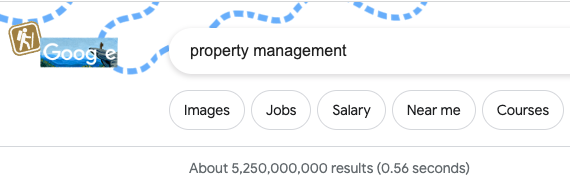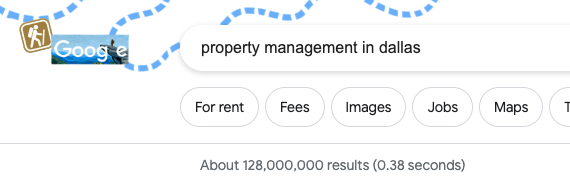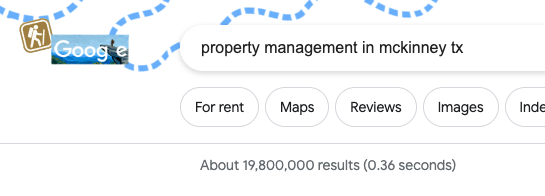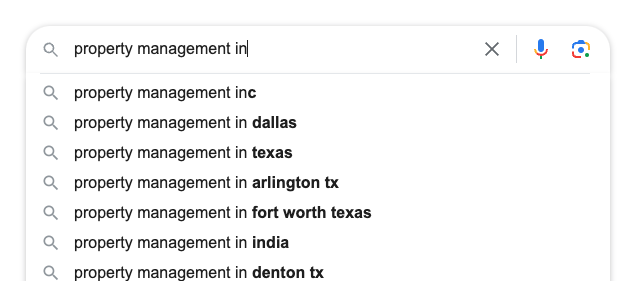
What Are the Best Free Keyword Research Tools You Should Use in 2024?
Listen to the article
What Are the Best Free Keyword Research Tools You Should Use in 2024?
How do you rank? It's challenging to rank high on SERPs (search engine results pages) as property management business owners because you work in such a niche market. Googling "property management" will not likely lead you to find your company at the top of the first page unless you are "the" top, most-searched-for property management company in (literally) the world.
However, you want your property management website to be found on the first page of Google because the number one listing gets 39.8% of all clicks — leaving the rest of the listings to fight it out for the remaining traffic.
So, how can you get to the top? Getting to the front page requires some dedication to the art of search engine optimization (SEO). Without SEO, you may very well have a helpful website — but if no one is finding it, your competitors are going to get all your business.
At the very heart of SEO is keyword research. So today, we focus on what that is and the best free keyword research tools to use to identify the best keywords to target in your content marketing strategy and rank up!
What Is Keyword Research?
Keyword research identifies terms people enter into search engines relevant to a business or topic.
For property managers, it means finding phrases potential clients might use when seeking property management services. This research helps tailor content to match user intent, improve search rankings, and drive organic traffic.
The right keywords can enhance visibility in search results, ensuring that a property management company is found by the right audience. Tools like Google's Keyword Planner assist in this process, providing data on search volume and competition.
Which Keywords Are Best for Your Property Management Website and Traffic?
Determining which keywords your ideal client base is searching for allows you to craft content that those users can then find. However, when deciding what to search for, you need to go further than property management.

Searching property management alone gives us about 5.25 billion results. That means you're competing with 6 billion other pages on property management if you want to be found for that keyword. However, drilling down further into a more specific location keyword, you can look at the keyword string property management in Dallas (our nearest large city).

This search brings us down significantly to 128 million results — far more achievable with good SEO than simply "property management." From there, we could decide to target even smaller cities around Dallas — or closer to home here in McKinney, Texas.

While there are still a lot of search results, we're down to about 19 million results, down from more than 5 billion! However, property owners will not only search for "property management in (city)." They are also going to search for a lot of things related to property management that might fit a specific need.
This is where keyword research comes in.
Here are some of the best free keyword research tools you should use in 2023 (and into 2024) to identify the relevant keywords for your company and content marketing strategy!
Yes, Google.
When searching for keywords, Google is usually a great place to start, as it is the most commonly used search engine — and the most advanced. Google uses the aggregate data of all of its users as well as its AI RankBrain, which helps Google deliver results for any query.

Google has two means of data mining for queries:
-
User data: Examples of this type include the number of people who keep scrolling past results on a search query (indicating it did not give good results).
-
Machine learning: Google can also tap into RankBrain to extrapolate what a user is looking for based on similar searches. With all this tech, Google tries to make the search experience easier and more productive, even suggesting results as you search.
These results are some of your most basic forms of keyword research. As you type in your query, such as "property management in," Google will pull data such as your location and search history to give you the most relevant results.

Look at these suggestions to help you guide your keyword research. Then, go into incognito mode and try it again. See if the results come up with other suggestions. In incognito mode, Google does not use your search data to help it predict; it uses the average data for your location.
These results can help you get a picture of what other local users are searching for in your area.
Ubersuggest
Another great free tool is Ubersuggest from famous marketing guru Neil Patel. It helps you search for keywords based on your domain, a competitor's domain, or a topic such as "property management" or "finding a property manager."
Ubersuggest is very easy to use. Not only does it help you choose keywords, but it also lets you know how difficult it will be to rank for them. This gives you the opportunity to secure some quick wins with easy keywords first to get traffic rolling while you work on the harder keywords you are targeting.
Answer the Public
Despite the strange man staring at you when you visit this site, it is very useful for long-tail keyword research! Enter a short keyword, and Answer the Public will show you a graph full of popular long-tail keywords that people are searching for related to your term.

Beyond the long-tail keyword ideas you get from this tool are the topic ideas you can use when creating content such as blog posts.
HubSpot
HubSpot used to have a direct keyword research tool, but it has since been replaced by a content strategy tool to help you create content pillars and topic clusters. Content pillars are groups of similar content that all support each other to let a user who is researching a topic acquire data with ease.

So, while using HubSpot for direct keyword research isn't part of the platform, it's still a valuable resource for property management companies to identify keywords that connect to content their audiences want to read.
By linking the content together through pillars and clusters, users can quickly find more pages on your site that are relevant to their needs — while also decreasing the bounce rate of your site. This also affects other relevance indicators from Google.
Optimize Your Property Management Website and Keyword Strategy With Geekly Media
If you need help building a keyword strategy, Geekly Media can help! We understand property management and SEO, so we can help you deploy relevant keywords through appropriate content that turns engaged visitors into leads.
We're here to help you get ahead on your property management marketing with better insights into SEO and how to implement the right strategies for more traffic.


-1.png)
